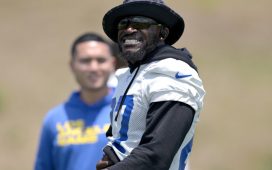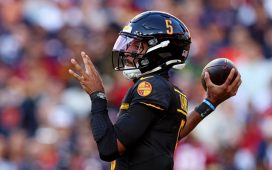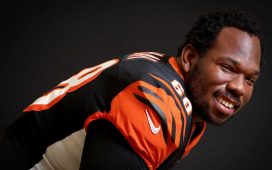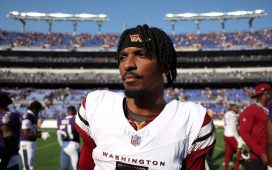This article is from Scoop City, The Athletic’s daily NFL newsletter. Sign up here to receive it directly in your inbox.
Diontae Johnson was traded to the Ravens, ending a confusing era in Carolina while the Vikings improved their offensive line, trading for Jaguars LT Cam Robinson.
But today, let’s talk quarterbacks:
Playoff Picture: What QB stats say about the race
When scrolling the leaderboards, a trend became obvious: Certain quarterback statistics tell the story of the NFL season so far. Below, the current playoff picture, with one QB stat defining each team’s season. Most are via TruMedia.
AFC
1. Chiefs (7-0): Patrick Mahomes sure likes Travis Kelce, as the quarterback leads the NFL in tight end target percentage (31.1) and targets his receivers at a league-low 45.8 percent clip.
2. Texans (6-2): No player has been hurried more than Stroud (35), who ranks first among active quarterbacks in total pressures (82) and fourth in pressure rate (27 percent). A share of blame goes to G Kenyon Green, whose 24 pressures allowed rank 110th of 110 guards, per PFF.
3. Steelers (6-2): Russell Wilson’s patented deep ball looks to be a perfect fit for Arthur Smith’s scheme, as Wilson leads the NFL with 9.5 yards per completion. Their red-zone struggles are a different story.
4. Bills (6-2): Josh Allen is throwing a league-low 0.13 interceptions per game, with just one in eight games. His TD-to-INT ratio (14.0) is tied with Tom Brady’s 2016 for the best mark since at least 1994.
5. Broncos (5-3): Of all quarterbacks with eight games played, only Allen has taken fewer sacks than Bo Nix (11), who helps Denver win by minimizing these negative plays — though he also leads the league in poor throws (51), per Pro Football Reference.
6. Ravens (5-3): Given Lamar Jackson’s rushing ability (his 501 yards rank 14th among all players), it feels unfair that his perennially underrated arm leads the NFL in passer rating (115.4) and first downs per pass attempt (43.2 percent).
7. Chargers (4-3): It’s no surprise that a Jim Harbaugh team is run-heavy, plus benefiting Justin Herbert by running play action on 32.6 percent of his dropbacks. Among players with seven or more games played, Herbert trails only Jared Goff and Jayden Daniels in this stat.
NFC
1. Lions (6-1): Goff’s completion percentage (74.1) leads the NFL, as Detroit schemes him open receivers. They’re so open that they lead the NFL in yards after the catch per completion (7.1).
2. Commanders (6-2): As a rookie, Jayden Daniels is sporting the league’s second-highest completion percentage (71.8) and is second in expected points added per dropback (0.25), a mark surpassed only by Lamar Jackson (whom Daniels does not want to be compared to).
3. Falcons (5-3): Kirk Cousins leads the NFL in spiked passes (three), evidencing how tight Falcons games have been. Their point differential (-1) is the closest mark to zero in the NFL.
4. Cardinals (4-4): Only Mahomes targets his tight ends more than Kyler Murray, whose 29.7 TE target percentage makes Trey McBride (and his fantasy managers) happy. Murray’s shiftiness is also a boon, as he takes a league-low 2.6 QB hits per game.
5. Packers (6-2): Jordan Love has thrown a touchdown on a league-leading 7.5 percent of his passes, illustrating the trust HC Matt LeFleur has in Love’s ability in the red zone.
6. Vikings (5-2): Sam Darnold leads the NFL in average time to throw, with his 3.29 seconds besting mobile quarterbacks like Jalen Hurts (3.21) and Justin Fields (3.20). Expect the loss of LT Christian Darrisaw to change this, though the addition of Cam Robinson softens the blow.
7. Eagles (5-2): Jalen Hurts leads the NFL with a 17.0 percent designed rush rate. He’s running for an average of 4.6 first downs per game, the second-highest mark in the past 30 years. Thank you, 🍑 push!
Time is up for Anthony Richardson
Yesterday, the word from Indy was that Joe Flacco will start Week 9 for the Colts. At 4-4, they’re facing the 5-2 Vikings while leaving a healthy — and well-rested — Anthony Richardson on the bench.
Colts beat reporter James Boyd noted that the 22-year-old hasn’t played like the promising QB he’d looked like last year, and “a big part of Richardson’s regression this year, I believe, has been head coach Shane Steichen’s play calling, which seems to be less tailored to Richardson’s strengths than it was last season.” No matter, especially after the quarterback subbed himself off when he felt tired.
With Richardson on the bench, James explains, “The hope is that he will sit, learn and grow behind Flacco before once again emerging as the team’s starting quarterback.” After tapping out for a play, Richardson needs to prove that he’ll never take his role for granted again.
At first glance, it’s the latest example of teams giving up on young quarterbacks:
Anthony Richardson is 22. Benched.
Bryce Young is 23. Benched.
Trey Lance is 24. Benched.
Justin Fields is 25. Benched.
Will Levis is 25. Benched.
Zach Wilson is 25. Benched.
Mac Jones is 26. Benched.
Kenny Pickett is 26. Benched.The NFL has a QB development problem.
— Sam Block (@theblockspot) October 29, 2024
None of those quarterbacks sat and observed a competent starter for at least the first halves of their rookie seasons. Think: Patrick Mahomes watching Alex Smith, Lamar Jackson with Joe Flacco, Jordan Love behind Aaron Rodgers. Coincidence?
Playing quarterback as a young NFL player is arguably the most difficult job in professional sports. It takes time to adjust to leading your teammates — millionaires who are often five to 10 years older — while learning to read a defense, react to the speed of the game and build rapport with receivers. All under the spotlight as an early 20-something.
Just ask the 1998 draft’s No. 1 pick, Peyton Manning. He started his rookie year at 22, Richardson’s current age. In 16 games, Manning threw 28 interceptions, completed just 56.7 percent of his passes and finished with a passer rating of 71.2.
But after that grueling 3-13 season, guess what? He improved. In year two, his completion percentage jumped to 62.1, he threw just 15 interceptions and the Colts finished 13-3. He nearly won MVP.
As Michael Jordan has said, “I’ve failed over and over and over again in my life. And that is why I succeed.” Still, Jayden Daniels and C.J. Stroud’s early success seems to prove that rookies can thrive on day one, without failing, that the Colts maybe don’t need to suffer through another eight weeks of Richardson’s struggles.
But they knew all along that this was different, that Richardson was raw when they drafted him at No. 4 in 2023. The blame for the latest “NFL fails young quarterbacks” episode lays at the feet of the team who drafted a QB project without any plans of letting him learn before handing him the wheel. They sold tickets and made headlines, but the optimism ended quickly.
The Athletic’s Mike Sando explains why a decision that makes no sense on the surface offers a window into a poorly understood NFL world.
Now, Dianna has a note from Houston.
What Dianna’s Hearing: Diggs injury unlikely to change Texans’ plans
Texans receiver Stefon Diggs is out for the year due to a torn ACL suffered on Sunday. The wide receiver and team captain was on a one-year deal; he will become a free agent as he works his way back (typical recovery time is 8-9 months).
Even with Diggs out, I don’t expect 6-2 Houston to be aggressive at the trade deadline. Rather, this is an opportunity for Robert Woods, Xavier Hutchinson and John Metchie III to step up, starting with a Thursday night road game against the Jets.
Back to you, Jacob.
Poll: Brock Purdy, a $60 million quarterback?
With the 4-4 49ers currently outside of the playoff picture, I couldn’t mention their 24-year-old quarterback above.
Since he was drafted in 2022, Brock Purdy leads the NFL in passer rating, is tied with Jayden Daniels for the highest EPA per pass attempt and is one of only two quarterbacks to throw more than 600 passes in their first 25 career games and maintain a passer rating higher than 110. The other? Patrick Mahomes.
All this while on a contract paying him less than $1 million per season, making Purdy the best quarterback value ever.
So, it’s a matter of when, not if the 49ers fork over a $60 million-plus annual contract. Right? With Purdy’s payday expected to come this offseason, I was shocked to see an NFL executive suggest to The Athletic’s Mike Sando that Purdy could be traded:
“They need to make a decision about whether they should just be moving on from this older core and building around Purdy, or do they trade Purdy, get stuff for him and go with a cheaper option at quarterback?”
I’m curious: If you were the 49ers GM, would you pay Purdy? Click here to vote. We’ll share the results next week.
📫 Enjoyed this read? Sign up here to receive The Athletic’s free daily NFL newsletter in your inbox, and check out The Athletic’s other newsletters.
(Photo: Kevork Djansezian / Getty Images)




